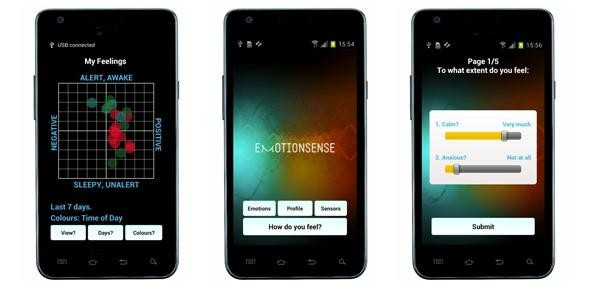Be Appy! Mood App Turns Smartphone into Therapist
University of Cambridge develops app to help monitor users’ mood swings

An app has been developed to help people monitor their mood swings and provide psychological support to the user.
A team from the University of Cambridge has developed the free Emotion Sense app for Android phones to track people's feelings and establish what triggers stress or relaxation.
Cecilia Mascolo, a reader in mobile systems at the university, said: "Most people who see a therapist may only have an appointment once every fortnight.
"Many, however, keep their phones with them most of the time. In terms of sheer presence, mobiles can provide an ongoing link with a person."
The researchers said the app takes advantage of smartphones being ever more capable of collecting information about our surrounding environment, such as noise, who we are communicating with and how much we are moving around.
As well as environmental factors, the app also gathers data from the user's own reports about their mood, which is entered into a system that has been designed by psychologists.
Users enter information on how they are feeling to an "emotional grid" and the app then conducts a survey to establish their emotional state.

The app sends the user notifications during different times of the day asking them about their mood.
After eight weeks of use, the app should become have a full range of sensors that provides the user with an insight into what is influencing their own moods.
The designers hope the app will create a precise record of what drives people's emotional peaks, working out when they will be most stressed and most relaxed, thereby providing help for people who need emotional support.
Jason Rentfrow, from the department of psychology, said: "Most other attempts at software like this are coarse-grained in terms of their view of what a feeling is
"Many just look at emotion in terms of feeling happy, sad, angry or neutral. The aim here is to use a more flexible approach, to collect data that shows how moods vary between people."
Neal Lathia, a research associate in the University's Computer Laboratory, explained: "Behind the scenes, smartphones are constantly collecting data that can turn them into a key medical and psychological tool.
"Any smartphone now comes with numerous sensors that can tell you about aspects of your life, like how active you are, or how sociable you have been in the past 24 hours. In the long term, we hope to be able to extract that data so that, for example, it can be used for therapeutic purposes."
© Copyright IBTimes 2025. All rights reserved.






















